Recent Blog Posts
What Are the Penalties for Motor Vehicle Theft in Illinois?
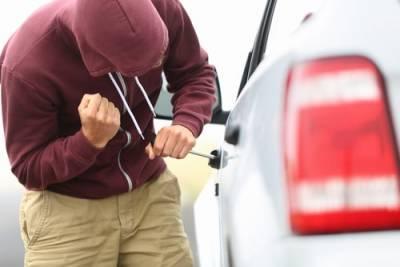 While stealing a car or other vehicle that belongs to someone else is a crime, there are a variety of other offenses that may be considered motor vehicle theft. Depending on the nature of a specific offense and the value of a vehicle that was allegedly stolen, a person could be charged with a misdemeanor or felony. People in Illinois who are facing these types of charges will want to understand how the law applies to their situation, and by working with an experienced criminal defense lawyer, they can determine their best options for achieving a positive outcome to their case.
While stealing a car or other vehicle that belongs to someone else is a crime, there are a variety of other offenses that may be considered motor vehicle theft. Depending on the nature of a specific offense and the value of a vehicle that was allegedly stolen, a person could be charged with a misdemeanor or felony. People in Illinois who are facing these types of charges will want to understand how the law applies to their situation, and by working with an experienced criminal defense lawyer, they can determine their best options for achieving a positive outcome to their case.
Different Types of Motor Vehicle Theft Charges
Motor vehicle theft may involve any situation in which a person possesses a vehicle owned by someone else when they are not entitled to do so. These charges may apply if a person takes, conceals, or sells another person’s vehicle or if a person receives or transfers ownership of a vehicle that they know to be stolen. Theft of a vehicle’s "essential parts," including its frame, doors, engine, seats, or radio, may be treated similarly to the theft of a vehicle as a whole.
When Can Traffic Violations Lead to a Driver’s License Suspension?
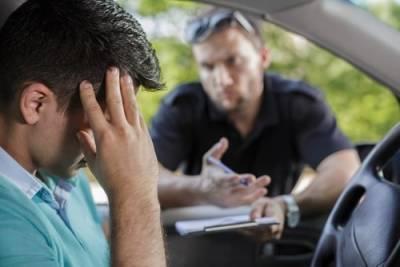 Most people have received a traffic ticket at some point in their lives, and in many cases, drivers are cited for minor traffic violations, such as speeding, running a red light, or failing to use turn signals. After receiving a traffic ticket, a driver will usually be required to pay a fine, and their insurance rates may increase. However, drivers should also be aware that multiple violations or serious traffic infractions could result in the suspension of their driver’s license. In these cases, drivers will want to work with an attorney and determine whether they can contest traffic violations and avoid the loss of their driving privileges.
Most people have received a traffic ticket at some point in their lives, and in many cases, drivers are cited for minor traffic violations, such as speeding, running a red light, or failing to use turn signals. After receiving a traffic ticket, a driver will usually be required to pay a fine, and their insurance rates may increase. However, drivers should also be aware that multiple violations or serious traffic infractions could result in the suspension of their driver’s license. In these cases, drivers will want to work with an attorney and determine whether they can contest traffic violations and avoid the loss of their driving privileges.
License Suspensions Under the Illinois Point System
When a driver is convicted of a traffic violation, a certain number of points will be added to their Illinois driving record. The number of points is based on the severity of the offense. Minor violations will usually involve between 5 and 20 points. For example, a speeding ticket where a driver was traveling 10 miles per hour or less over the speed limit is worth five points, and disregarding a traffic light or signal is worth 20 points. More serious offenses may involve between 25 and 55 points. Examples of these types of violations include aggravated speeding at least 26 miles per hour over the speed limit, which is worth 50 points, or reckless driving, which is worth 55 points.
New Law Will Eliminate Cash Bail in Illinois by 2023
 In recent years, advocates for criminal justice reform have fought against bail requirements for criminal defendants. When a person is charged with a crime, they will usually be required to pay an amount of bail set by a judge before they can be released from police custody. Advocates have argued that this places an unfair burden on lower-income defendants, and the practice has led to many people being required to remain in prison while awaiting trial if they are unable to raise the funds to secure a release. Recently, Illinois passed a law that will eliminate cash bail, along with other changes meant to protect the rights of defendants and address police accountability.
In recent years, advocates for criminal justice reform have fought against bail requirements for criminal defendants. When a person is charged with a crime, they will usually be required to pay an amount of bail set by a judge before they can be released from police custody. Advocates have argued that this places an unfair burden on lower-income defendants, and the practice has led to many people being required to remain in prison while awaiting trial if they are unable to raise the funds to secure a release. Recently, Illinois passed a law that will eliminate cash bail, along with other changes meant to protect the rights of defendants and address police accountability.
Pretrial Detention and Release in Illinois
The new law, which was passed on January 13, 2021, and is currently awaiting Governor J.B. Pritzker’s signature, will make all defendants eligible for pretrial release without the requirement to post monetary bail. However, there are a number of exceptions that may prevent a person from being released. These include situations in which a person is charged with a violent crime, including:
Can I Refuse to Take a Breathalyzer Test When Pulled Over for DUI?
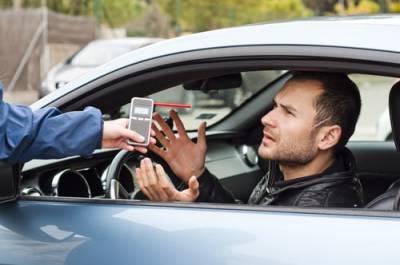 Any type of traffic stop can be a nerve-wracking experience, since even low-level traffic violations can result in fines, penalties to a person’s license, increased insurance rates, and other consequences. However, situations where a person may be suspected of driving under the influence of alcohol or drugs can be even more stressful, since a conviction on DUI charges can lead to driver’s license suspension or revocation, potential time in prison, and a permanent criminal record. In these cases, drivers will want to understand their rights regarding breathalyzer testing, including the potential consequences of refusing a blood alcohol test.
Any type of traffic stop can be a nerve-wracking experience, since even low-level traffic violations can result in fines, penalties to a person’s license, increased insurance rates, and other consequences. However, situations where a person may be suspected of driving under the influence of alcohol or drugs can be even more stressful, since a conviction on DUI charges can lead to driver’s license suspension or revocation, potential time in prison, and a permanent criminal record. In these cases, drivers will want to understand their rights regarding breathalyzer testing, including the potential consequences of refusing a blood alcohol test.
BAC Testing and Implied Consent
Anyone who drives on public roads in Illinois is presumed to have given consent to chemical testing to determine their blood alcohol content (BAC) or whether they have other intoxicating drugs in their system if they are arrested on suspicion of DUI. However, it is important to understand what types of tests this implied consent applies to.
What Penalties Can I Face for Texting While Driving in Illinois?
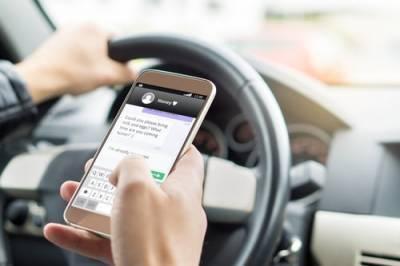 When you are behind the wheel, you are required to follow a multitude of different driving laws, and these are meant to protect the safety of everyone who uses the roads. Understanding these laws can not only reduce the chances of being involved in car accidents or other situations that put you or others in danger, but it can also help you avoid traffic violations. However, people often make mistakes, and you could find yourself being pulled over by a police officer and facing a traffic ticket for texting while driving or other violations. In these cases, you will want to understand exactly how Illinois law applies to your situation, including the penalties that may apply for a violation.
When you are behind the wheel, you are required to follow a multitude of different driving laws, and these are meant to protect the safety of everyone who uses the roads. Understanding these laws can not only reduce the chances of being involved in car accidents or other situations that put you or others in danger, but it can also help you avoid traffic violations. However, people often make mistakes, and you could find yourself being pulled over by a police officer and facing a traffic ticket for texting while driving or other violations. In these cases, you will want to understand exactly how Illinois law applies to your situation, including the penalties that may apply for a violation.
Illinois Law Regarding Cell Phones and Electronic Devices
In Illinois, drivers are prohibited from using "electronic communication devices" while operating a vehicle on a roadway. Electronic communication devices include cell phones, as well as other handheld or portable computers and GPS or navigation devices that are not integrated into a vehicle. Prohibited uses of these devices include making calls (except in hands-free mode), reading or sending text messages or emails, or watching or streaming videos.
When Is Retail Theft Charged as a Misdemeanor or Felony in Illinois?
 There are a variety of situations in which a person may find themself facing criminal charges. These charges should always be taken seriously, since a conviction can result in multiple different types of penalties, including fines, jail time, probation, community service, and a permanent criminal record. Retail theft, commonly known as shoplifting, is an offense that can result in either misdemeanor or felony charges, and those who have been accused of retail theft should be sure to understand how Illinois law applies to their situation, the potential consequences they may face, and the best defense strategies against these charges.
There are a variety of situations in which a person may find themself facing criminal charges. These charges should always be taken seriously, since a conviction can result in multiple different types of penalties, including fines, jail time, probation, community service, and a permanent criminal record. Retail theft, commonly known as shoplifting, is an offense that can result in either misdemeanor or felony charges, and those who have been accused of retail theft should be sure to understand how Illinois law applies to their situation, the potential consequences they may face, and the best defense strategies against these charges.
What Is Considered Retail Theft?
While shoplifting will often involve pocketing merchandise and leaving a store without paying for these items, retail theft can take a variety of other forms. According to Illinois law, retail theft can also include:
What Makes Underage Drinking Such a Serious Offense in Illinois?
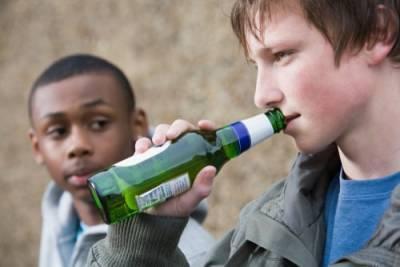 Although this New Year’s Eve will likely include fewer social gatherings than in years past due to the pandemic, it is common for minors to engage in underage drinking at this time of year, either with or without their parents’ knowledge. While this may seem innocent enough, underage drinking often has serious legal and personal consequences that can affect a teenager or young person for the rest of their life.
Although this New Year’s Eve will likely include fewer social gatherings than in years past due to the pandemic, it is common for minors to engage in underage drinking at this time of year, either with or without their parents’ knowledge. While this may seem innocent enough, underage drinking often has serious legal and personal consequences that can affect a teenager or young person for the rest of their life.
Consequences of Underage Drinking in Illinois
In Illinois, underage drinking is a serious offense; in fact, while it is not a felony, it is a misdemeanor, carrying with it possible penalties including jail time and substantial fines. In addition, Illinois has a "Zero Tolerance" policy for underage drinking and driving. If a person under the age of 21 is caught on the road driving with any alcohol in their system, even if they are below the legal blood alcohol content limit for adults, they can face serious consequences, including getting their driving privileges revoked for two years at minimum. In some cases, underage drinking and an accompanying charge or conviction can also have far-reaching effects on a teenager’s future, including:
What to Know About Commercial Driver’s License Violations in Illinois
 In Illinois, if you drive a truck or other commercial vehicle, you must possess a commercial driver’s license (CDL) in addition to a personal driver’s license. Both to earn your CDL and to keep your CDL, you need to meet higher standards than the average driver. The same goes for the laws that you must abide by, and as a result, many commercial driver’s license violations are not as easy to handle as a typical traffic violation. In fact, serious commercial driver’s license violations in Illinois like commercial driver’s license DUI, aggravated speeding, reckless driving, and even failure to report violations from other states can lead to not only driver’s license suspension but also much more serious penalties.
In Illinois, if you drive a truck or other commercial vehicle, you must possess a commercial driver’s license (CDL) in addition to a personal driver’s license. Both to earn your CDL and to keep your CDL, you need to meet higher standards than the average driver. The same goes for the laws that you must abide by, and as a result, many commercial driver’s license violations are not as easy to handle as a typical traffic violation. In fact, serious commercial driver’s license violations in Illinois like commercial driver’s license DUI, aggravated speeding, reckless driving, and even failure to report violations from other states can lead to not only driver’s license suspension but also much more serious penalties.
8 Common Examples of Forgery and Other Deceptive Practices in Illinois
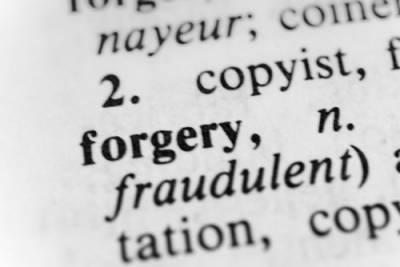 In Illinois, in its simplest terms, forgery can be understood as the knowing and willful falsification of signatures, documents, or objects. Once such items are falsified, the charges can be compounded by the propagation of these false items or other defrauding activities that lead to another individual or organization being misrepresented or losing something valuable, money or otherwise. Forgery and other deceptive practices are quite common, mainly because they can run the gamut, comprising a wide variety of defrauding actions.
In Illinois, in its simplest terms, forgery can be understood as the knowing and willful falsification of signatures, documents, or objects. Once such items are falsified, the charges can be compounded by the propagation of these false items or other defrauding activities that lead to another individual or organization being misrepresented or losing something valuable, money or otherwise. Forgery and other deceptive practices are quite common, mainly because they can run the gamut, comprising a wide variety of defrauding actions.
Common Acts of Forgery and Illegal Deception
Among the many examples of forgery and other deceptive practices in Illinois are:
-
Forged checks—If you sign someone else’s name on their check without their knowledge or approval, you are committing fraud.
What to Do If Facing a Domestic Violence Charge During Lockdown
 With lockdowns due to the COVID-19 pandemic having occurred throughout the country, and indeed the entire world, there has been an uptick in domestic violence as partners and families are spending more time in close quarters. Recently, November 25 marked the International Day for the Elimination of Violence Against Women, with protests in countries around the world attempting to raise awareness of this important issue.
With lockdowns due to the COVID-19 pandemic having occurred throughout the country, and indeed the entire world, there has been an uptick in domestic violence as partners and families are spending more time in close quarters. Recently, November 25 marked the International Day for the Elimination of Violence Against Women, with protests in countries around the world attempting to raise awareness of this important issue.
With tensions running high during this time, you may also be more likely to face allegations of domestic violence that you believe to be unfounded. If so, an attorney can help you protect your rights and develop a defense strategy through which your perspective can be heard. Know that an accusation does not necessarily have to result in a criminal conviction.
Responding to Allegations of Domestic Violence in Illinois
Here are some suggestions to guide you through any possible domestic violence charges you might face when staying at home during the pandemic:








